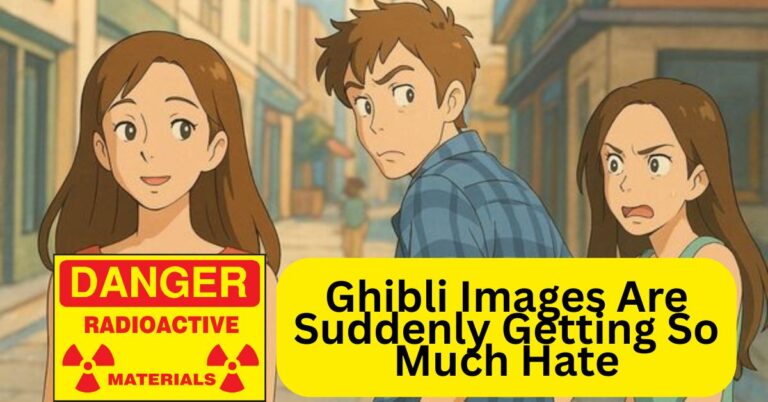My feeds were suddenly loaded with Ghibli-style images including memes dressed in those recognisable soft colours & beautiful landscapes, me as whimsical character & my dog running through wonderful forest. I initially believed it to be harmless fun. However I had to determine why backlash struck like surge of water. After researching this topic I’ve come to the conclusion that hate isnt arbitrary; rather, it stems from two major problems: ethics & the environment. Both perspectives are important & have completely changed my perspective on this trend.
Table of Contents
ToggleEthical Dilemma: Copying a Legacy
Lets start with ethical side because its gut punch when you really think about it. Studio Ghibli’s art style isnt just some generic filter you can slap on anything—its masterpiece crafted over decades by Hayao Miyazaki & his team hard effors. Those gentle hues way wind seems to dance through every frame, soulful characters—it’s their lifes work, steeped in a philosophy that celebrates human effort & emotion. I mean Miyazaki himself is legend who have spent years perfecting hand-drawn animation, frame by painstaking frame. So when I saw how easily AI could churn out images that mimic that style, it hit me: this feels wrong to me.
Its like if I’d spent years perfecting recipe only for someone to toss it into machine & crank out copies without heart or story behind it. Sure the AI pics look pretty but they’re missing that human touch—the pain, the joy, the intention Miyazaki talks about. I stumbled across this old clip from 2016 where he watched AI-generated animation & called it “an insult to life itself.” He wasnt mincing words & I get it now. For him art isnt just about end product; its about process, the struggle, the humanity. AI skips all that & hands you a knockoff. Its fast food versus a home-cooked meal—convenient but soulless.
Then theres question of permission. Did OpenAI even ask Studio Ghibli if they could train their model on those films? I couldnt find a clear answer but OpenAI claims they take a “conservative approach” & stick to “broader studio styles” rather than copying individual artists. That sounds like fancy way of dodging issue. If they didn’t get consent, it’s basically using someone’s copyrighted work without asking—a legal gray area thats already sparked lawsuits against other AI companies. When I think about how protective I’d be over my own creations, it makes me wonder: is this trend disrespecting very artists we claim to admire?
The Environmental Cost: A Hidden Price Tag
The ethical stuff was already weighing on me but then I dug into the environmental angle & its just as bad—if not worse. Generating these AI images isnt some magical cost-free process. It takes ton of computing power, which means energy & lots of it. I read that making a single AI image can use as much energy as charging my phone. That doesnt sound like much, right? But when millions of us are doing it—myself included—it adds up fast. OpenAI’s CEO even joked about their servers “melting” from the demand which isnt just a laugh—its hint at how much juice their data centers are burning through, not to mention the water needed to cool them.
I found this study that really drove it home: generating 3,400 images with a model like Stable Diffusion XL pumps out as much carbon dioxide as driving car 4.1 miles. One image isnt crisis but scale it up & we’re talking serious emissions. And for what? A cute Ghibli-style pic of my cat? It started feeling frivolous, especially when I thought about Studio Ghibli’s own films. Take Princess Mononoke—its all about respecting nature, showing how human greed can wreck the planet. Yet here I was, jumping on an AI trend that’s racking up environmental tab, all while claiming to love that aesthetic. The irony stung.
Why the Hate Makes Sense Now
After all this, I get why AI-generated Ghibli images are getting so much hate. Its not just people being cranky or anti-tech—its about real, messy issues. Ethically, its a slap in the face to artists like Miyazaki, who’ve built something irreplaceable, only to see it mimicked without soul or consent. Environmentally, its reckless drain on resources at a time when we’re already wrestling with climate change. I’ll admit, I was tempted to keep playing with generator—it’s fun, it’s novel. But now, knowing cost, I’m rethinking it.
This trend might’ve started as playful gimmick but its left me with some heavy questions. How much do we value human creativity? What are we willing to sacrifice for quick digital thrill? Maybe its time we pause & consider the bigger picture—before next AI bandwagon rolls in.

